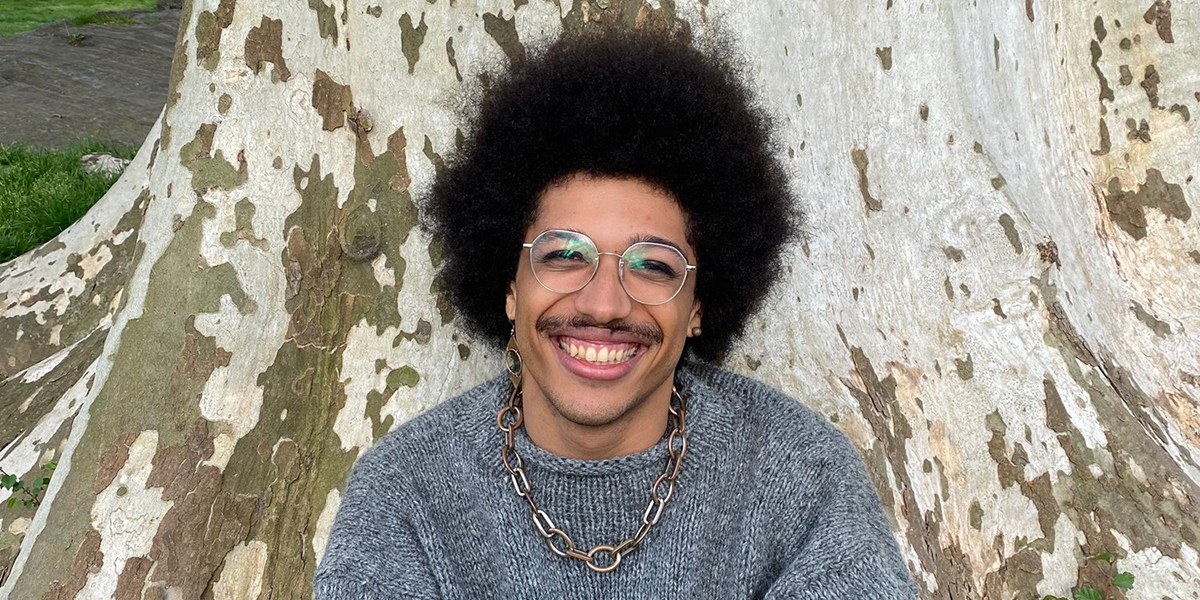The Gory Details: Nicholas Whittaker on Philosophy and Black Horror Cinema
To hear Nicholas Whittaker tell it, horror movies are greater than the sum of their terrifying, putrid parts.
“[Horror] allows us to sit in that feeling that the world is something you could never fully understand—and that’s also the place where philosophy is born,” says Whittaker, assistant professor of philosophy. “Philosophy happens when you recognize that your ways of making sense of the world—whether with science, with history, with psychology—aren’t cutting it anymore. When it feels like there’s an excess of unintelligibility in the world, that’s [also] where horror thrives.”
This semester, Whittaker is digging beneath the gore and the jump scares in two new classes: Horror Film and Philosophy and Black Horror Film: A Philosophical Introduction. In harnessing films engineered to elicit lizard-brain reactions, the horror genre reveals itself as a springboard to deeper intellectual territory.
“One aim [of these courses] is to give students interpretive tools for understanding horror,” Whittaker says, “but the other aim is to argue that horror films themselves are interpretive tools for understanding your life.”
Before jumping into horror movies as a teenager, Whittaker (who uses they/them pronouns), developed a childhood obsession with Tim Burton’s macabre, horror-adjacent fantasy films. “Horror is very central to our aesthetic lives, a lot more than we give credit for,” they say. “We all have different relationships to horror as a discrete genre, but we’ve all consumed—out of real joy and love—art that’s given us a feeling of something like horror . . . The ghost story is essential to every kid’s development, right?”
With their affinity for philosophy blossoming at the same time, Whittaker came to recognize the headiness of horror: Night of the Living Dead was as valid a vessel for thinking about existential dread as the writings of Jean-Paul Sartre. (“Horror becomes a tremendously useful vocabulary for talking about and thinking through the world,” Whittaker says.) They saw a particular richness in Black horror, a storytelling tradition that, Whittaker argues, extends to 19th-century stories like Strange Case of Dr. Jekyll and Mr. Hyde. “Even though [Jekyll is] not clearly about race, there’s a subtle way in which a white-beauty ideal is this foil for thinking about the monster that is not this perfect ideal,” Whittaker says.
In cinema, Whittaker traces an arc of Black horror from The Birth of a Nation in 1915, which featured heavily racist presentations of Black characters; to Son of Ingagi in 1940, featuring a Black-majority cast and the transformation of a racist depiction of a monster into a sympathetic victim; to Tales from the Hood in 1995, a pivotal Black independent film which, Whittaker says, embraces and subverts cinematic conventions. “The voodoo witch, the zombie, the magical freaky kid: they all become these anti-racist heroes,” they say. Meanwhile, the most recent crop of Black horror, like Ma and Get Out, deals with the anxieties that emerge in attempts to build cohesion across racial lines.
Whittaker’s classes draw on this cinematic source material in discussions of subjects ranging from race and gender to political power and self-identity. In Horror Film and Philosophy, philosophical concepts—like the differences between form and content of a work, or between emotion and mood—give students tools to analyze and interpret art more broadly.
In the class Black Horror Film: A Philosophical Introduction, students read Frantz Fanon’s writings on decolonization and watch the 1972 film Blacula. This allows them to explore a century of Black horror film through a quirky point of entry to a larger history of racial iconography.
“We live in a world in which popular art often encodes all sorts of political ideologies and presumptions, and gaining the skills to unpack them is really useful,” they say. “But the other important thing is that it’s aimed at giving students narrative resources for thinking about their own lives.”
While Black horror films have found mainstream success in recent years, they’ve also collided with widespread conversations about the merits and failings of entertainment centered on Black trauma. Those conversations are important, Whittaker says, but “one thing they’ve lost is this therapeutic possibility of art, to hold your hand through the darkness instead of papering over it.”


